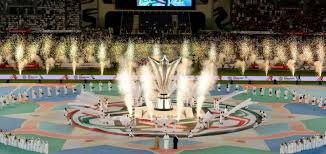By Paul Nicholson in Abu Dhabi
January 10 – The 17th and biggest ever Asian Cup currently being hosted in the UAE completed its first round of group games yesterday. Expanded from 16 to 24 teams, this is a competition that is opening a remarkable new world of football frontiers. It has spotlighted countries too often on the periphery of global football and is generating stories, new legend and football history every day.
It is the fashion for confederations to expand their big national team competitions. Europe led the way with a much-criticised expansion of 16 to 24 teams, CONCACAF’s Gold Cup is going from 12 to 16 this year, Africa has expanded and shifted from winter to summer.
The cases for and against expansion, and the too often political reasons behind it have commonalities across all the confederations, as well as for FIFA’s big daddy expansion to a 48-team global fiesta.
UEFA’s expansion was more fuelled by former president Michel Platini’s need to keep his national federation stakeholders onside than a desire to make the tournament the highest standard of football on the continent. The result was – and even the UEFA technical report acknowledges it – a drop in the quality of football played. Has this damaged the tournament? As an event, probably not. As a high-level football spectacular for the purist, almost certainly, but only time will really tell.
It would be a mistake to turn this into Asia’s or the AFC’s narrative. A ‘western’ interpretation of this expansion misses the point that Asia is not Europe. It would be far too convenient to make it so.
For a start Asia has a different football eco-system that is far less developed in most of its countries. Football development is still in many countries a frontier activity. The expanded Asian Cup increases that opportunity in a region that covers more than a third of the world’s population. It is quite a responsibility.
In what is the most politically complex region in world – in football and geo-politics equally – what is taking place is a football tournament. A point worth remembering. And so far it has been a pretty competitive one with the first round of matches providing more upsets and surprises than most big tournaments deliver over their duration.
The opening game saw Bahrain draw with the UAE in a last gasp thriller that saved the blushes of the host nation and sent the message that in Asia perhaps football dreams really can be achieved. The next day saw that happen with Jordan beating current AFC Champions Australia – a humbling result for a regional powerhouse.
Then India woke up with a big 4-1 win over Thailand that no-one saw coming. New boys Philippines lost by just a goal to South Korea (Spurs’s Son Heung-min can’t get here quick enough). Turkmenistan, also unfancied tournament debutants, provided a jolt to a new and, at least on paper, exciting looking Japan.
Eight out of 10 games have been decided by one goal – hardly a football story of ritual sacrifice that many were predicting.
Even Iran’s 5-0 win over Yemen was a spectacle worth watching. Iran are a class, if somewhat emotional, act under Portuguese coach Carlos Queiroz. Yemen haven’t been able to complete a full league fixture calendar for more than three years in a country that is being tragically bombed flat. The stories of the Yemeni heroes, their physical journeys to this tournament (never mind their emotional ones) made them the real victors in this match and worth a very special place in football history. On their own they are a justification for this tournament’s expansion.
The Yemeni’s stories aren’t unique. Iraqis, Syrians, and Palestinians all have real stories to tell. Certainly beats wondering which body part David Beckham or Zlatan Ibrahimovic will have tattooed next.
The actual football is the big ‘takeaway’ from this tournament. The disappointment so far is that the local organisers haven’t attracted more people to the stadiums to be part of the AFC Asian Cup UAE 2019 story. Hopefully that will change as the tournament builds and it would certainly be helped if local broadcast distribution could forget the parallel geo-politics of the Qatari/Saudi-UAE blockade and use the power of the broadcast media to engage with a wider base.
And as for the football politics? That’s for later. Today we have Bahrain vs Thailand, Jordan vs Syria and India vs UAE, that’s enough excitement. Wake up rest of the world, this place is starting to buzz.
Contact the writer of this story at moc.l1743729958labto1743729958ofdlr1743729958owedi1743729958sni@n1743729958osloh1743729958cin.l1743729958uap1743729958


